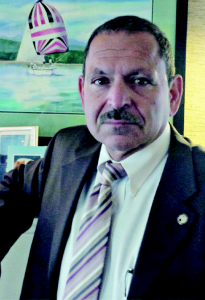by Dave Workman | Senior Editor
A trio of Portland, OR, 8th graders is getting attention for producing a “documentary” on gun control that aired on C-SPAN, which sponsored the national Student Cam documentary contest, according to KOIN News.
But this is no typical one-sided project that gives only obligatory lip service to firearms rights considerations. There’s a surprise right up front.
Daniel Gotkowitz, Henry Craddock and Mackie Mallison—all students at Portland’s Beverly Cleary Middle School—took second place in the competition, which attracted 2,355 submissions from more than 4,800 students in 46 states.
Their seven-minute film features Ceasefire Oregon Research Director Katie Pool, US Congressman Earl Blumenauer and clinical psychologist Frank P. Colistro, the report noted.
Blumenauer, in the film, thinks “gun violence” should be treated “like a medical issue.
But viewers of the film are in for a surprise if they expect Colistro to launch a diatribe about guns and how they need to be strictly regulated.
“Our society regulates firearms just fine, in much the same way that we regulate motor vehicles,” Colistro said in the film. “So, even though there isn’t a constitutional amendment that says we have a right to have a car, and there is one that says we have a right to have a firearm, they’re treated really more as a privilege than a right and the majority of the people who own them use them responsibly, and people who use them irresponsibly or criminally at the very least they don’t get to use them or have them at all. Usually whatever sentence is (handed) down as a result of a crime is greater because a firearm is used with it. The bottom line is, firearms don’t cause violence.
Violent people cause violence.
TGM contacted Colistro in Portland, where he has a private practice. He has been called as an expert witness and has been involved in hostage and barricade negotiations with local law enforcement. When asked by other professionals what can be done to identify people who might commit acts of violence and get them help before the fact, his response might be surprising.
“My answer is that this is not a mental health issue, it’s a security issue,” he said. “If somebody is running at me with a knife, the question is not ‘why is he doing that,’ the question is ‘how do I neutralize the threat?’” Dr. Colistro attended Portland State University and received his doctorate from the University of British Columbia when that university was somewhat the “birthing area” for studies on violence, threats and risk assessment.
Today, he is a member of the Association of Threat Assessment Professionals.
While everyone wishes everybody in society was nice, he explained, the truth is there are some people who aren’t.
“A lot of these people are just bad people,” Colistro observed. “They are angry, resentful people who decide they’re going to have their moment of power and control by harming innocents.
You have to recognize the fact that these people exist out there. You just have to neutralize them.
About mass shooters, Dr. Calistro recalled that as far back as Charles Whitman, the Texas tower sniper, such people have given warning signs.
“These guys exhibited warning signs and nobody said anything,” he noted.
He predicted the same thing will eventually be revealed about the teen who attacked fellow students with two knives at a high school in western Pennsylvania (See story elsewhere in this issue).
The Oregon psychologist has 37 years’ worth of experience in these matters and his matter-of-fact observations about dealing with dangerous people will raise some eyebrows.
His comments during the gun control documentary provide a glimpse of a fellow who does not look at the world through rose-colored glasses, but with the eyes of experience.




